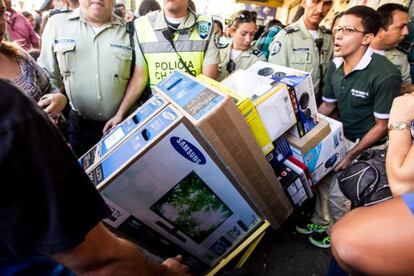“Looting” is a dirty word for Venezuelan broadcasters
Maduro government prohibits the use of the term in ransacking reports

Venezuelan television and radio stations these days are trying to use all kinds of imaginative euphemisms to try to describe the ransacking of electronic retailers, which have been taking place across the country over the recent days, without using the word “looting.”
On Monday, the national telecommunications regulator Conatel asked broadcast media outlets to avoid the term “looting” and video images that show people running off with goods in their news reports.
According to the NGO Venezuelan Observatory of Social Conflict, there have been at least 39 violent incidents aimed at private businesses – nine lootings and 30 attempted ransacks – between Saturday and Tuesday, the Caracas daily El Nacional reported.
Last Friday, President Nicolás Maduro announced an “economic war” on price gouging, and ordered the military to take over the electronic chain Daka because he claimed its owners were inflating prices after receiving preferential dollars to pay for electronic imports. Since he announced that the military would be slashing the prices of products sold at Daka by up to 90 percent, thousands of Venezuelans have rushed to the stores.
“Nothing should be left in their warehouses,” Maduro declared.
In Valencia, hundreds of customers invaded one Daka store and began running off with flat screen TVs, appliances, washing machines and other electronic items without paying for them.
Videos of incidents – which also took place in San Félix, in the south, Puerto la Cruz, in the east, and Ciudad Ojeda, in the west – have made it onto the social networks.
Venezuelan television stations have decided on a form of self-censorship to avoid any sanctions or even cancelations of their broadcast licenses by Conatel. Radio reporters can also being heard on the airwaves struggling to avoid what the government considers an off-limits word as they broadcast live on-the-scene reports.
For the Maduro government, “looting” has an historic, negative context in Venezuela. It conjures up memories of the wave of violent incidents that began on February 23, 1989 during the government of President Carlos Andrés Pérez – who was the late Hugo Chávez’s nemesis – when thousands of Venezuelans broke into shops and stores in days-long looting sprees that began in Caracas and spread across the country. The violence was the result of IMF-applied austerity measures, which included sharp hikes in prices for public transportation, food and consumer goods.
“This is out of proportion,” said Ricardo Antela, a constitutional expert who worked at the opposition Globovisión network, about the Conatel order. “One thing is asking for restraint in using the word and another thing is prohibiting it completely.”
Tu suscripción se está usando en otro dispositivo
¿Quieres añadir otro usuario a tu suscripción?
Si continúas leyendo en este dispositivo, no se podrá leer en el otro.
FlechaTu suscripción se está usando en otro dispositivo y solo puedes acceder a EL PAÍS desde un dispositivo a la vez.
Si quieres compartir tu cuenta, cambia tu suscripción a la modalidad Premium, así podrás añadir otro usuario. Cada uno accederá con su propia cuenta de email, lo que os permitirá personalizar vuestra experiencia en EL PAÍS.
¿Tienes una suscripción de empresa? Accede aquí para contratar más cuentas.
En el caso de no saber quién está usando tu cuenta, te recomendamos cambiar tu contraseña aquí.
Si decides continuar compartiendo tu cuenta, este mensaje se mostrará en tu dispositivo y en el de la otra persona que está usando tu cuenta de forma indefinida, afectando a tu experiencia de lectura. Puedes consultar aquí los términos y condiciones de la suscripción digital.








































